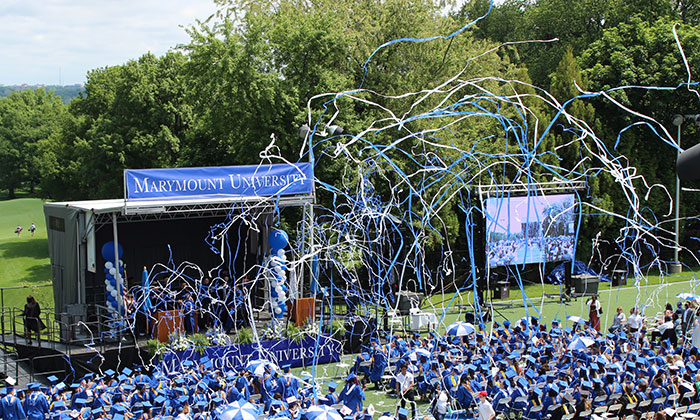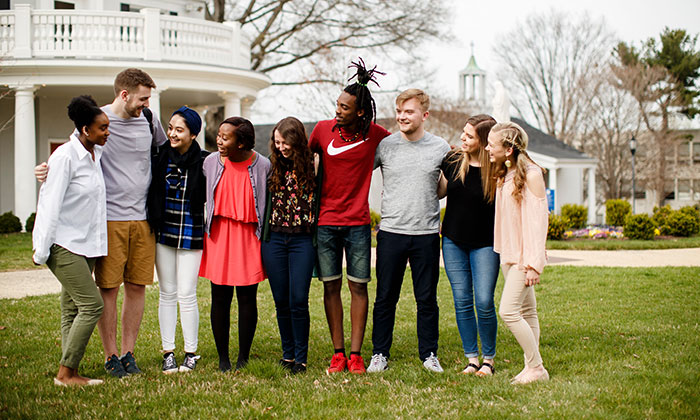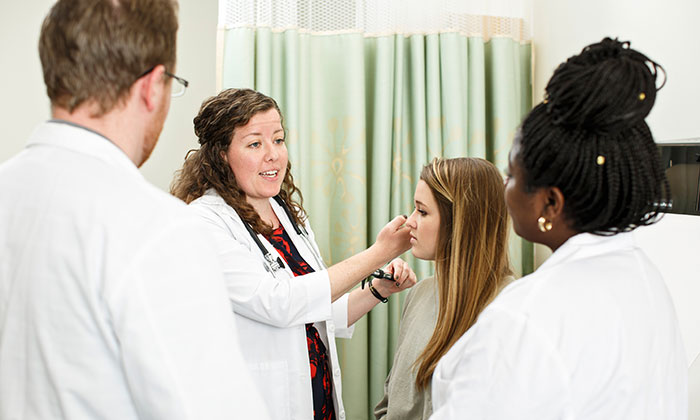In the latest edition of the U.S. News & World Report’s Best Colleges Rankings, Marymount University has debuted on the list of ‘Best National Universities’ – a reclassification that has been years in the making and an achievement that will be celebrated on campus for accomplishing a key goal in the institution’s Strategic Plan.
Previously classified as a ‘Regional University of the South,’ this is the first time Marymount has appeared in the Best Colleges Rankings alongside top universities that offer a range of undergraduate, master’s and doctoral programs while also emphasizing faculty research and the awarding of professional practice doctorates. Garnering this national recognition was a sought-after goal described in the University’s new vision from Marymount’s most recent Strategic Plan, ‘Momentum,’ which guides the institution’s quest for growth and excellence between 2019 and 2024. Despite the impacts from COVID-19 and potential delays as a result of the pandemic, Marymount fulfilled this strategic goal well ahead of schedule.
“This is incredible news for the entire Marymount University community, and is a culmination of several years of dedicated efforts from our faculty and staff to enhance this institution and make the jump from good to great,” said Dr. Irma Becerra, President of Marymount University. “In ‘Momentum,’ we pledged to become nationally recognized for innovation and commitment to student success, alumni achievement and faculty and staff excellence. Joining the ranks of our nation’s top universities demonstrates that we have realized a crucial part of our Strategic Plan, and a move like this could truly change the trajectory of our University’s future.”
Along with transitioning to the ‘Best National Universities’ category, Marymount was also acknowledged for its diverse campus community, global perspective and the strength of its Nursing program. The University was listed at No. 23 nationally in the U.S. News & World Report’s ‘Campus Ethnic Diversity’ ranking, which identifies institutions where students are most likely to encounter undergraduate students from racial or ethnic groups different from their own. This places Marymount ahead of all Virginia private institutions, as well as all colleges and universities in Washington, D.C.
“We pride ourselves at Marymount for striving to resolve inequities that harm American society, many of which we have seen on full display due to COVID-19’s disproportionate effects on communities of color,” President Becerra said. “As Virginia’s first and only Hispanic-Serving Institution (HSI), and a University that is a beacon for diversity in general, we do this by focusing on successfully retaining our Saints, ensuring they can graduate in four years or less and providing them a path to successful careers and professional outcomes.”
In the ‘Schools with the Most International Students’ category, which ranks institutions by the percentage of international students in their undergraduate enrollment, Marymount placed at No. 20 nationally, with 14 percent of its undergraduate students coming from abroad. This percentage is higher than at any other college or university in Virginia or the DMV region. Marymount’s international students come from all over the world, with its three largest international markets – Saudi Arabia, El Salvador and Ethiopia – all located on different continents. Its reach in Central America is particularly strong, with large numbers of students from Guatemala and Honduras also attending Marymount.
Well known as one of Marymount’s most reputable degree options, the University’s undergraduate Nursing program was ranked as the second-best B.S.N. offered by Virginia private institutions. The Malek School of Nursing Professions was recently in the news for the recent establishment of the Dr. Mark Abbruzzese Bridge Scholars Program, a joint effort with Sibley Memorial Hospital in Washington, D.C., to support need-based scholarships for Marymount Nursing students and foster a pipeline between the two institutions to help tackle a nationwide workforce shortage. The Bridge Scholars Program was funded by an over $1 million donation from Marymount trustee John Shooshan and his wife Marcia.
The jump to national recognition in the Best Colleges Rankings was made possible by Marymount’s reclassification as a Doctoral/Professional University by the Carnegie Classification of Institutions of Higher Education this past year, as the University now features eight different doctorate program offerings and continues to grow its research capacity. Increases in Marymount’s average first-year retention rate and graduation rate also helped the institution achieve national status, as well as its 14:1 student-faculty ratio and small class sizes – about 49 percent of courses at Marymount consist of less than 20 students.
“With this high level of engagement and interaction between faculty and students, you’re not just a number here at Marymount. No matter what stage of life students are in, whether they just graduated from high school or are adult learners who are aiming to reskill themselves for the workforce, Marymount offers a great variety of cutting-edge academic programs that are catered to what today’s employers are looking for,” explained Dr. Hesham El-Rewini, Provost and Senior Vice President of Academic Affairs at Marymount University. “This breadth of quantity and quality in new programs couldn’t happen at just any institution. Our university’s nimble and agile professional environment allows us to achieve innovative growth at a breakneck speed.”
Scores from U.S. News & World Report are determined through several weighted key measures of quality that consist of graduation and retention rates, social mobility, graduation rate performance, undergraduate academic reputation, peer assessments, faculty resources, selectivity, alumni giving, graduate indebtedness and more. For more information on the overall methodology used by U.S. News & World Report for its Best Colleges Rankings, click here.







